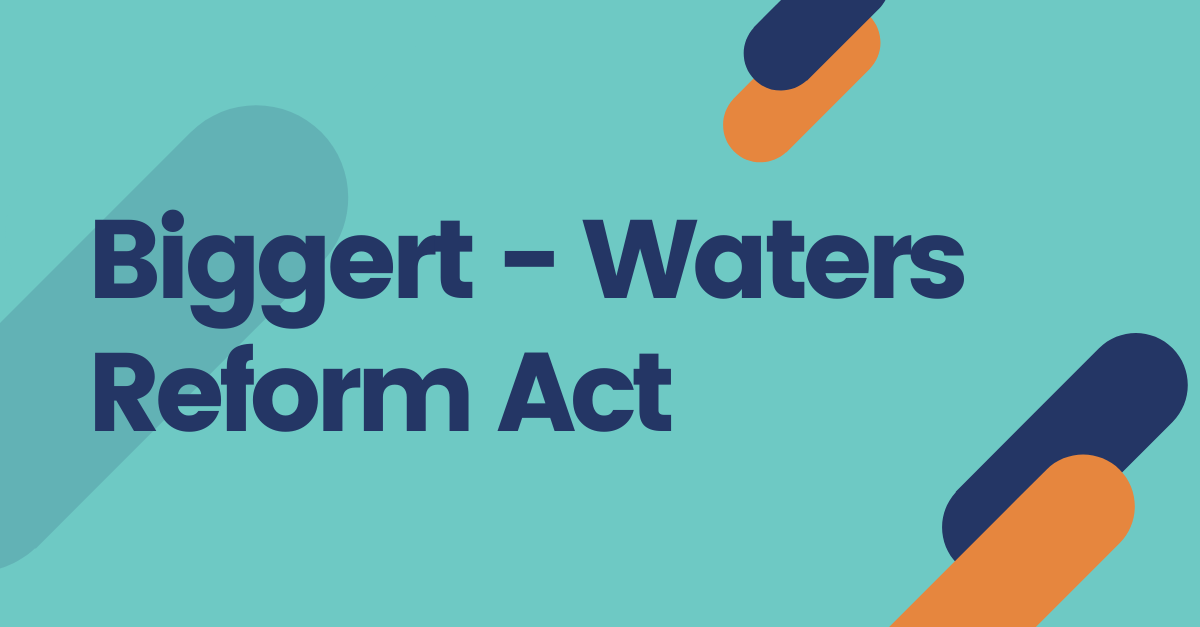Required to Accept Private Flood Insurance Under Biggert-Waters Reform Act
By: Adam M. Matheny
Regulated Institutions Required to Accept Private Flood Insurance Under Biggert-Waters Reform Act
Several different organizations have come together to implement a portion of the 2012 Biggert-Waters Flood Insurance Reform Act. This portion, ruled upon by the Federal Deposit Insurance Corporation, the Office of the Comptroller of the Currency, the National Credit Union Administration, the Board of Governors of the Federal Reserve System, and the Farm Credit Administration, mandates that regulated financial institutions must accept private flood insurance policies that meet the act’s standards. Following the ruling, which went into effect on July 1, 2019, the FDIC, OCC, and the Federal Reserve have all updated the necessary manuals for regulated financial institutions to ensure compliance. There are four primary components to this final ruling, which we will explain in more detail below.
Mandatory Acceptance
There is a statutory definition of “private flood insurance” included in the act, and the final rule makes it clear that regulated financial organizations must now accept policies which meet this definition. The definition is as follows:
- The insurance policy is issued by an insurance company which has been approved, or licensed, as necessary
- The coverage meets or exceeds the Standard Flood Insurance Policy (SFIP) issued by the National Flood Insurance Program (NFIP)
- The policy requires that the issuer must provide 45 days notice to both the borrower and the lender if the policy is to be cancelled or not renewed
- Provides the customer with information about the coverage available via NFIP
- Provides a mortgage clause that performs similarly to the one included in an SFIP
- Requires that customers must file suits within a year of receiving a denied claim in writing
- Requires cancellation provisions be followed that are at least as restrictive as those included in an SFIP
Institutions will carefully review all private flood policies to ensure that they adhere to this definition. If it does, in fact, meet these requirements, then financial institutions are obligated to accept it.
Compliance Aid
There is a provision included in the final rule, which can assist regulated financial institutions in their reviews of various private flood insurance policies: if the policy contains the exact language of 42 U.S.C. 4012a(b)(7) with regards to the definition of private flood insurance, it can be accepted without further review. This exact language is not required; if a policy does not contain it, the financial institution is still obligated to fully review the policy to see if it meets the criteria for acceptance.
Discretionary Acceptance
Additionally, institutions may be able to accept some policies which do not meet the definition of private flood insurance as provided above, if it meets other requirements, including:
- The coverage meets or exceeds the flood insurance purchase requirement amount
- The policy covers both the property owner and their lender—some exceptions include condominium associations and other groups
- The policy sufficiently protects the loan it is designed to cover and is reasonably consistent with safety and soundness, as documented by the institution, in writing.
Institutions may accept policies under either mandatory acceptance or discretionary acceptance.
Coverage by Mutual Aid Societies
In addition to the mandatory acceptance review and the discretionary acceptance review, there is are also special review conditions under which policies issued by mutual aid societies may be accepted, for example, the flood insurance offered by the Amish Aid Plan.
This review is extremely similar to the discretionary acceptance review in terms of conditions, with a notable exception. In order to accept a policy issued by a mutual aid society, the policy must be approved by the institution’s federal regulator. The OCC, for example, provided approval that cleared the way for acceptance of policies issued by both the Amish Aid Plan and the Mennonite Aid Plan. Regulated institutions must approach their federal regulator with each mutual aid society policy to have it evaluated on a case by case basis.
Conclusion
Regulated institutions will be held to a high standard going forward, with strong requirements regarding review of private flood insurance policies. This will require a great deal of additional time, as well as other resources. As a result, it’s in the best interest of these institutions to begin to implement streamlined policies which will facilitate the most efficient and accurate reviews of these policies possible.
Conclusion
Regulated institutions will be held to a high standard going forward, with strong requirements regarding review of private flood insurance policies. This will require a great deal of additional time, as well as other resources. As a result, it’s in the best interest of these institutions to begin to implement streamlined policies which will facilitate the most efficient and accurate reviews of these policies possible.
